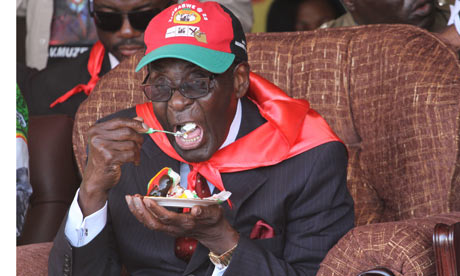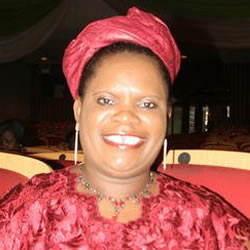Reform in Zimbabwe?

Relying on Mugabe (pictured on his 88th birthday in February), as the best candidate for regaining political power reflects the limited options available to the former ruling party. Photograph: Aaron Ufumeli/EPA
Almost four years since the signing of the global political agreement (GPA) that brought Zimbabwe's Movement for Democratic Change (MDC) into a lopsided power-sharing arrangement with Robert Mugabe's Zanu-PF, the country is once again heading towards elections, now expected within a year.
The GPA has achieved some stability, enabling modest progress on reform, but an array of problems remain. Spoiler behaviour, especially by Zanu-PF, has not been adequately dealt with, although the Southern Africa Development Community (SADC), as co-guarantor with the African Union of the political agreement, has consistently rejected Zanu-PF efforts to fast-track elections without reforms.
The EU will soon announce whether it renews or lifts its ban on direct development assistance to the Zimbabwean government, as well as asset and visa restrictions. In place for a decade, these sanctions have not achieved their objectives. Instead, they have been used as a propaganda stick against the EU, which Robert Mugabe and his supporters accuse of promoting regime change and undermining the economy. Such allegations have successfully diverted attention from the governance and human rights violations that brought about these measures in the first place.
A stalemate has ensued whereby the EU (and the US, which implements its own measures) calls unsuccessfully for reforms as a basis for lifting sanctions. Zimbabwe and the SADC argue that their continued imposition compounds an already fraught political atmosphere, which in turn frustrates the promotion of reform.
The extraordinary SADC heads of state summit in Angola in June narrowed Zimbabwe's reform agenda to concentrate on completing the constitution-making process and called for the creation of an implementation mechanism and timeframe for the draft election roadmap that was signed in July 2011. But there are still key disagreements between Zanu-PF and the MDC in relation to the security sector, elections and media reform.
Given the glacial pace of reform, it's fair to ask what will and can SADC do to accelerate the process in the time available? Jacob Zuma, the South African president and the SADC facilitator on Zimbabwe, has not been to Harare since late November 2010 and his "hands-off" approach has raised concern. Though it forces the Zimbabwean negotiators to take more responsibility, it also provides opportunities for obfuscation and resistance.
Zanu-PF's resistance reflects its own internal preoccupation with factionalism and the politics of succession. Relying on Mugabe, an 88-year-old with failing health, as the best candidate for regaining political power reflects the limited options available to the former ruling party. This has generated fears of a political vacuum and the potential of a violent succession struggle, in which political opponents would be targeted. Senior politicians and securocrats have inferred that they would rather burn down the house than hand power to Morgan Tsvangirai's MDC, even if they won the elections. Zanu-PF is not averse to employing high-risk strategies and many analysts concur that they would use violence (as they did in 2008) if they calculate it is a feasible option.
SADC must step up its game, but must navigate carefully if it is to promote reform without excluding key elements of the Zimbabwean equation. There has been post-summit movement toward finalisation of the draft constitution, deployment of SADC representatives to the GPA's internal monitoring body and steps taken to create an implementation mechanism for the roadmap. Zuma is expected in Harare imminently to meet with the GPA principals on specific disagreements.
But the security sector – who controls it, to whom or what it is loyal – remains a crucial and potentially destabilising factor. As do issues relating to intimidation, violence and impunity, and the complicity of the criminal justice sector. In light of the violence that accompanied the 2008 elections, and the partisan rhetoric of some senior security officials, Zimbabwe should not be expected to go to new elections without firm assurances that history will not repeat itself.


 myAfroTube
myAfroTube
 bettymakoni
bettymakoni asante
asante Malema
Malema
Very revealing. Isn't it?